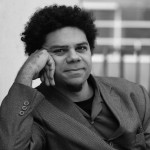Fiona Wright and Miles Merrill were directors of the Verse & Voice: A Poetry and Spoken Word Festival at Writing NSW on 14 March 2015. This is an edited transcript of a debate presented by Writing NSW in 2014.
FIXED ON THE PAGE
On the page, poetry is a slow kind of literature. A slow kind of reading, a slow kind of thinking; it is different to prose precisely because of this pace — you can’t read a poem quickly; or more precisely you can’t understand it at the same rate. Because all poetry is a bit wild, weird and shaggy, and I think it’s only really untamed on the page: any performance always dictates, to some extent, what shape it takes, what emphasis, which tonality. A really powerful poem is one that holds its secrets, its power close. One that unravels slowly, makes us immediately want to read it again, stays buzzing in your brain for days afterwards — lends itself to re-reading and reflection. This is exactly what I like about poetry: its ambiguity, its mutability.
And both of these things, ambiguity and mutability, are only possible with repetition, with slow unfolding. They need to be fixed to the page so that we can return to them again, and then again, each time slightly different, each time met again. As a teenager, I loved the boldness of TS Eliot’s ‘Love Song of J. Alfred Prufrock’, the strangeness of its perspective. Returning to it 10 years later, I noticed its despair, its loss, its brokenness — things that very few 18-year-olds have any reason to recognise. With repetition, the poem met me again, differently; the same pages, but not the same story.
Because it’s the poem, and not the poet, that is important here. Poetry on the stage needs to be carried by a poet, by a persona, by a voice that has its own inflections and its own history. That’s why poetry on the stage often relies so heavily on rhyme and rhythm and refrain — not cheap tricks any of them, but not the most mysterious rabbits that can be pulled from the proverbial hat. Poetry on the page is different. The poet can slip away here, can be invisible.
A poem can have the ability to speak directly to you, and it can speak exactly for you. I’m thinking here mostly of lyrics, those short, moment-grabbing personal poems, written in first person. On the page, when I read ‘I’ and ‘You’ in a poem, something strange always occurs: because I almost ‘speak’ the poem in my head when I read, and that ‘I’ becomes my own voice. And yet, because I know I am not the poet, the ‘you’ is a direct address to me. I am, that is, both me and you at once within the poem; and this is a complicated act of cognition, and an incredibly powerful act of empathy. It’s not only seeing two sides to the story, but being, actively inhabiting, both of those sides at once.
Poetry is also a spacious kind of writing and reading: on the page, the shapes it makes, the gaps and breaks are generative, a kind of meaning-making in themselves. I love the idea that the line of a poem always stands in a kind of tension with the sentence itself, that the two things tug away at meaning between them. One of the poets who does this best is Gwen Harwood, whose line-endings are rife with puns and beautiful ambiguities. This is her famous ‘Suburban Sonnet’:
boils over. As she rushes to the stove
for Rubinstein, who yawned. The children caper
She comforts them; and wraps it in a paper
Look at the run-on lines: those breaks between ‘zest and love’ and ‘drain out’, between ‘matter’ and ‘to no one’, hold you suspended for a moment on something important, before letting it be undermined. She places end rhymes too on ‘stove’ and ‘love’, ‘played’ and ‘afraid’, ‘dead’ and ‘bread’, so that each pair is spatially linked, even though they semantically contradict each other. This kind of subtle space-play, the little stumbling it forces the brain to do before it can progress: these things just can’t be done on the stage.
The power of page poetry is in this kind of strange unfolding, this enforced slowness, these double-takes and doubling backs. It’s in repetition and rethinking and, dare I say it, in contemplation. Real power has to be worked at, and that’s only possible on the page.
Fiona Wright is a doctoral candidate with the University of Western Sydney Writing & Research Centre. Her poetry collection Knuckled (2011) won the Dame Mary Gilmore Award for a first collection in 2012.
MORE THAN THE ARTEFACT
You have in your hand a volume of Shakespeare’s Macbeth. You can read the verses to yourself or you can watch Hugo Weaving perform the work at Sydney Theatre. Which do you prefer? Do you feel like staying home or going out? Craving sometimes introversion and at other times extroversion you do both, one on Tuesday, the other on Friday. It seems ridiculous to argue one experience is better than the other, but for most people the live performance wins out. Is the question a social and psychological question about introversion and extroversion? Public versus private, ephemera versus artefact?
We need all of these dichotomous aspects of self to live a full life. The most preferable artform becomes subject to each person’s experience. It can be as simple as, ‘I’ve been out dealing with people all day. I need to stay home and curl up with Chris Wallace Crabbe’ or ‘I’ve been cooped up inside. I feel like getting out and listening to Tug Dumbly.’
One of the issues with artefact versus ephemera is that academics (the go-to experts in most current affairs) have a hard time validating experiential data. They may say, ‘If there’s no document, how can it be studied?’ So, if there is no body of work assessed by experts, how do we know it’s important enough to devote time to? Has it been tested? Is it safe? Internet audiences are judging cultural value for themselves. Sure, it can lead to cat videos, but it can also support enlightened niches.
Any poem can and should be read aloud as an intrinsic part of the process of its creation. While the poem is written, sculpted, carved and blossoming through limitless drafts, its rhythms, metre and general movement will pound silently in the writer’s head as internal monologue. To say it aloud gives a gift to those nearby and helps the writer to better gauge the flow of language, aiding their editing process.
Yes, the creation of a poem on a page is a solitary process. The appreciation of that poem can be as well. So how does an audience access a writer’s work? Poets deliver readings, yet most don’t see reading their work in public as part of their craft. Some make no effort. The presentation is an annoying necessity which promotes their otherwise introvert art: ‘Don’t look at me. Look over there on the table. That little rectangle. That’s the real me. Judge the artefact, not the artist.’
Now, what if you are a person who has laudable literary skill and has trained as an actor? You are in a room full of people and have your full self to give. There is no monotonous mumbling, shuffling of paper, bowed head poking out above a tall brown podium. If a poem is read aloud to an audience, that audience deserves the poet’s rehearsal and hopes for some oratory skill.
People took the train on a Tuesday night in the rain and paid 10 bucks. They could be watching Seinfeld re-runs or having a candle-lit dinner with their new fling. The poet must match that effort with gesture, eye contact and a natural conversational voice that delivers their poetry directly to the people in the room.
Shane Koyzcan wins The Guardian’s Book of the Year. Anis Mojgani is nominated for the US National Book Award. Omar Musa publishes a highly acclaimed novel. They are all poetry slam champions and published poets. When they are in the room, you are so thankful to have more than the artefact. You have direct human to human communication of the highest order. Sure, it’s ephemera. You didn’t catch every line. You buy the book so you can go back, reread and soak up more.
You don’t expunge the riveting experience that held you enraptured for 20 minutes or more. With some performing writers, their books can be like a beautiful photo album you peruse to remind you of that life- changing adventure you had at the performance. Performances and poetry books complement each other, the experience of one enhances the enjoyment of another.
The key advantage of a poetry book over a live performance is the ease with which we can reject it. Take ‘bad’ poetry: in written form you, the consumer, can put it down after a few seconds. The publisher can toss it in the bin. The reviewer can kill it. Writers who do not perform need to work harder to be called a poet. There are more hurdles to clear if they want to gain access to an audience.
Sometimes with a live poetry event you can feel stuck. There are not enough gate-keepers, filters or peer-reviews. Live poetry events are often poorly curated open mics with no budget for a professional artist. The audience has to be the judge and sift through a pile of work that would otherwise end up on a journal editor’s desk. This can be an excruciating lottery or, if we step outside of the “poetry” box, it can generate a sense of community where the aim is not just artistic excellence but to have a local creative forum where more marginalised cultures and ideas are shared and explored. You get access to voices, thoughts and people you wouldn’t have chosen to grab off the shelf. New poets access audiences immediately. This accessibility brings poetry alive to those excluded from academia all together. It can assist with developing literacy and allow for self-expression by people who don’t necessarily call themselves poets.
A person cannot reach as many places at once as paper or viral video. The person is of course more valuable than the object which represents them. The experience of them is more rare. Perhaps those who choose the path of writing poetry, statistically speaking, are more likely to be introverted and need an outlet other than verbal communication to feel more at ease with expressing themselves. Putting them in front of an audience is simply terrifying. I know I get terrified every time.
When you have the luxury of meeting the author, and they have the dual ability to be both an inspiring introspective thinker and an extroverted engaging communicator, you have the joy of both worlds. This preference for the live experience is borne out by an increase in the number of ticket sales and attendance records for poetry events versus the number of books being sold.
This is more true with an artform like poetry than with a novel. Many artforms don’t need direct contact with their creators. The argument doesn’t apply at all to graphic design. If the feel of the book and the look of its cover were paramount then we would be comparing poetry with the visual arts.
Miles Merrill is a writer, performer, facilitator and event coordinator who combines poetry with theatre, experimental audio, hip-hop beats, stand- up and, occasionally, political confrontation. He is the creative director of Word Travels and founder of Australian Poetry Slam.


